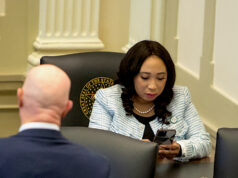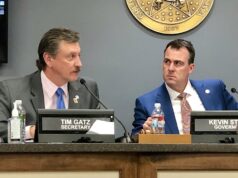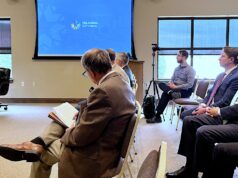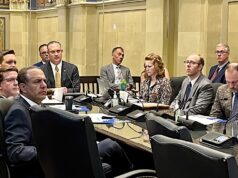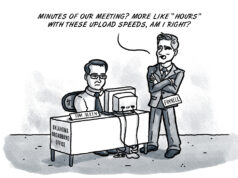

On Wednesday, Oct. 24, the Oklahoma Institute for Child Advocacy held a debate (embedded below) between Oklahoma’s Democratic and Republican candidates for lieutenant governor.
The lieutenant governor is first in succession for the governorship, serves as the president and tie-breaking vote in the Oklahoma State Senate and heads the Tourism and Recreation Commission.
Current Lt. Gov. Todd Lamb has served since 2010 and did not run for re-election because of term limits. This year, he ran for governor but lost in the GOP primary.
Ivan Holmes: ‘Enough is enough’
Independent Ivan Holmes did not attend the OICA debate, which News 9 streamed. In a followup interview with NonDoc, he expressed his frustration with party politics and urged Oklahomans to consider an independent.
“I started talking to people. They were upset with both parties because they thought there was gridlock and all they wanted to do was just destroy each other and they just weren’t getting anything done,” Holmes said.”I’ve got it on my signs, on all of them: Enough is enough, vote independent.”
A former chairman of the Oklahoma Democratic Party, Holmes said he left the position he left because he couldn’t bring everyone “to the middle.”
Having been a professor for 30 years, Holmes listed education as his most important issue among his top three. The other two are nursing home abuse and earthquake prevention as it relates to wastewater dumping.
“I lived in Edmond for 50 years and never had an earthquake,” he said. “And now we’ve got pollution, and that’s an issue everyone seems to want solved.”
He also referenced his pro-education writings and his 2014 campaign for superintendent of public instruction.
“I’ve written 50 articles on education,” Holmes said. “You’ve got to fund education, you’ve got to let them do their job, you’ve got to have discipline in those classrooms. I got in the car and drove 20,000 miles, and all these schools out here said you’re the first guy who’s ever driven out here.”
Holmes also spoke at length about an increased need for transparency and openness in state government. He said such a principle unites the independent statewide candidates, and he promised he would champion transparency.
“We’ve got to have these open meetings and open records. Oklahoma is one of the most closed states,” he said. “I want to put the ACLU out of business by not having to sue 100 times to get records they should have (…) I just think if you have a state office, it ought to be open.”
Even if he’s not a voter’s choice, Holmes encouraged Oklahomans to make openness a priority.
“What we’re telling people is that if you like our issues which, I’m telling you 99 percent of people do, and you don’t want to vote for us then whoever you vote for, you make them sign before you vote for them that they’ll have open meetings and open records,” he said.
A major task of the lieutenant governor is to chair the Oklahoma Tourism and Recreation Commission.
“My theory is that tourism is just a piece, again, of the overall picture,” Holmes said. “If your job is to try to bring people in here and come to Oklahoma, they need a good infrastructure, they need to have a good environment. You have to have something to sell. Oklahoma is last in everything that’s good and we’re first in everything that’s bad. So first, you’ve got to clean up your own house.”
Holmes said he was against State Question 798, which would put the governor and the lieutenant governor on the same ticket starting in 2026.
“I don’t think the lieutenant governor has to be just a rubber stamp to work with the governor,” he said. “I just think that should remain as it is.”
Sen. Anastasia Pittman: ‘Sick children can’t learn and sick people can’t earn’
Sen. Anastasia Pittman (D-OKC) won election to the House of Representatives in 2006, where she served until 2014. She then began serving in the State Senate in 2014. Term limits prevent Pittman from serving another term in the Legislature.
During the debate on News 9, Pittman spoke about her vision for the office of lieutenant governor.
“If I’m elected, the first thing that I believe the role of the lieutenant governor should do is to work with other people,” Pittman said. “And so for me, my role would be to promote tourism and economic development. Increase entrepreneurship opportunities and make sure we defend Oklahoma’s values.”
She also spoke at length on how she believed the lieutenant governor’s office could be an advocate for education.
“Why do we have over 500 school districts and only 77 counties? So until we’re able to consolidate schools or consolidate administration and look at how education is delivered in the state of Oklahoma, we’re going to keep having this conversation whether we have money in the Rainy Day Fund or not,” Pittman said.
She also saw Oklahoma’s acceptance of federal Medicaid dollars as away to help students.
“The first thing I would do as lieutenant governor would be to expand early childhood education. We have it in about 13 counties, we need it in all 77 counties (…) If children are sick, then they need health care, they need access to health care,” Pittman said. “So taking the Medicaid expansion for our state would help the lieutenant governor’s role to provide educational services. Sick children can’t learn, and sick people can’t earn.”
She said she would also increase literacy programs.
Pittman referred to several times to what she called “smart dollars.” To her, the state could benefit from increased scrutiny on where it puts revenue.
“It’s where we invest the dollars. We don’t have a revenue problem, we need to know where to invest those dollars,” Pittman said.
In particular, she said being smarter with tax dollars could help alleviate the state’s incarceration problem.
“We need to be smart on crime. We’ve been hard on crime, and we’ve incarcerated people who have addictions,” Pittman said. “So until we put smart dollars into mental health and not overly incarcerate people — but we also have solutions where we put career tech in prisons.”
On the subject of tourism, Pittman said she has worked with Rep. Earl Sears (R-Bartlesville) to update Oklahoma’s tourism website. She said there was still work to do.
“We have to figure out how to navigate people through our state to where it’s user friendly,” Pittman said. “Families want to live, work, thrive and play here in Oklahoma, and tourism can help us do that. Tourism is a lucrative industry. For every $1 we invest in tourism, we get $7 back.”
Pittman did not come down on one side or the other of SQ 798.
“When you limit the voter’s opportunity to choose, I have a problem with it. I have a problem with term limits. I have a problem with term limits and when you line a seat up with the governor and you attach them together, that means the gubernatorial candidate gets to choose. It takes away the choice of the voters,” Pittman said. “But I think it will save the state money.”
Matt Pinnell: ‘I firmly believe this is an economic development job’
Republican Matt Pinnell is a small business owner and former chairman of the Oklahoma Republican Party.
“I firmly believe this is an economic development job,” Pinnell said. “There’s not another statewide position that sells and promotes Oklahoma. It’s not the labor commissioner’s job, not the insurance commissioner’s job, it’s the lieutenant governor’s job.”
For economic development, Pinnell said the first step is diversifying Oklahoma’s economy.
“We’re way too dependent upon the price of oil. We always have been in this state,” Pinnell said. “This is an oil and gas state, but if that’s all we have then we’re going to continue to be on a roller coaster down at this state Capitol. We’ve got to diversify this economy, foster entrepreneurship and small business growth.”
He said education plays a role in economic development.
“It starts with education. It is true, we are not going to be able to retain or recruit jobs to the state of Oklahoma unless we do a better job with K-through-12 education, that’s the long and short of it,” Pinnell said.
He identified teacher shortages and instructors unequipped to deal with non-English speaking students as major concerns.
Pinnell was receptive to the idea of accepting federal Medicaid dollars, but had reservations.
“The only deal-breaker for me [in regards to the Medicaid expansion] is if we don’t have a conversation about what other states are doing with those matching dollars,” Pinnell said. “It’s a nine-to-one (match), $9 for every $1 we have to come up with (…) I look at states like Arkansas, Michigan, that have accepted those federal dollars, but have put their own plan together (…) So for me, taking those federal matching dollars is something that I would agree with, but it has to be an Oklahoma plan. Oklahoma’s not Maine.”
Pinnell advocated for line-item budgets for state agencies.
“We do not make agencies line-item budget. We need to get back, in my opinion, to zero-base budgeting,” Pinnell said. “We’ve got to get back to zero-base budgeting so these agencies are proving to us why they need a 15 percent increase. And I know a lot of them do, but taxpayers in this state want to make sure that their taxpayer dollars are being spent wisely.”
Pinnell did not take a stance on SQ 798, but said he thought it would pass.
“I prefer a hybrid version to where parties get to pick their nominees and then you run as a ticket after, but that’s not how the state ballot question is written, and it doesn’t go into effect for eight years,” Pinnell said. “So it would not affect us or a potential re-election effort.”
(Correction: This story was updated at 11 a.m. Saturday, Nov. 3, 2018, to note the Oklahoma Institute for Child Advocacy hosted the lieutenant governor debate.)









